The Proverbs of Hell 29/36: Secondo
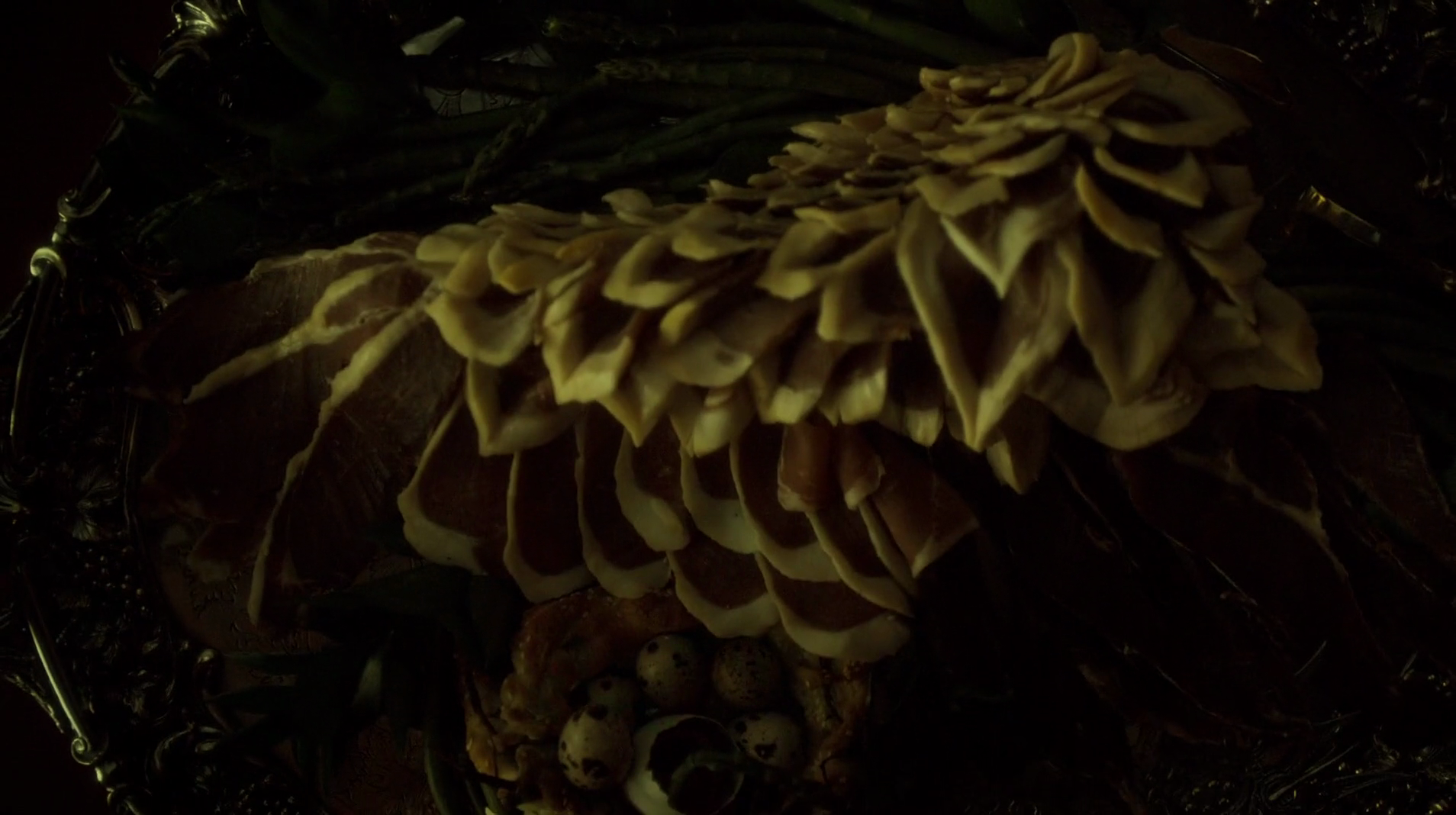 SECONDO: The heavier of the two main courses, typically meat-based. This is in no way a heavier or more substantive episode than “Primavera,” so do what you want with that.
SECONDO: The heavier of the two main courses, typically meat-based. This is in no way a heavier or more substantive episode than “Primavera,” so do what you want with that.
BEDELIA DU MAURIER: Forgiveness is too great and difficult for one person. It requires two: betrayer and betrayed. Which one are you?
HANNIBAL: I’m vague on those details.
BEDELIA DU MAURIER: Betrayal and forgiveness are best seen as something more akin to falling in love.
HANNIBAL: You cannot control with respect to whom you fall in love.
Bedelia is recapitulating Bella with her account of forgiveness. Hannibal does not notice this, which speaks to his overall state: Hannibal is sullen, withdrawn, and even pouty here – his “I’m vague on those details” feels like an admission of weakness unlike anything we’ve really seen from him before. It is not quite an admission of regret for “Mizumono,” but there is a clear sense that Hannibal feels as though his response was in some way disproportionate or rash.
BEDELIA DU MAURIER: You’re going to get caught. It’s already been set into motion.
Bedelia glimpses the Aristotlean unities underpinning Hannibal’s reality.
Every season of Hannibal has an early episode that works according to a narrative logic unlike the rest of the series; “Œuf” in Season One, and “Hassun” in Season Two. “Secondo” joins them, putting Hannibal in contact with the classically and unreconstructed gothic. Unlike “generic cop show” and “legal thriller,” this is actually a genre collision with deep roots in Hannibal’s DNA, as opposed to things with deep roots in the NBC primetime schedule.
I groused last week that Will’s “conjuring ghosts” was a thread that was insufficiently pulled on. This, however, where he conjures an imaginary Hannibal to serve as his interlocutor, is clearly a variation on the tendency. But Hannibal is the object of Will’s pursuit – in a normal version of “Will does the crime scene thing,” Hannibal would be the role he steps into. This thus lies somewhere between conjuring up Abigail to accompany him and his usual practice, a reflection of and commentary on the peculiarity of Will and Hannibal’s relationship.
WILL GRAHAM: The spaces in your mind devoted to your earliest years… are they different than the other rooms?
WILL GRAHAM: Are they different than this room?
HANNIBAL: This room holds sound and motion, great snakes wrestling and heaving in the dark. Other rooms are static scenes, fragmentary…
A rare quote from Hannibal Rising, which is entirely appropriate given that this episode is basically the show’s one big concession towards adapting that book. That doing so should produce the seasonly “out of genre” episode speaks volumes about this late contribution to the ouvre, apparently written purely so that Dino De Laurentiis wouldn’t have his own Hannibal Lecter origin piece written. (Fuller himself has suggested he views it as having a slightly more lowly canonical status, noting that he knows the other three Lecter books far better than Hannibal Rising.)
Even to a knowledgeable reader, the discovery of a young Asian woman with a rifle on the Lecter estate is not quite what one would expect, doubly so because it’s not Lady Murasaki, who goes entirely unmentioned in this episode (although she was alluded to in “Kaiseki”). Instead this is Chiyoh, an astonishingly minor character in Hannibal Rising chosen, apparently, so as to have someone closer in age to Hannibal and Will instead of the elderly woman that Murasaki would be at this point, Chiyoh being described as Hannibal’s age. In classic Hollywood casting style, then, she’s played by a woman ten years younger than Hugh Dancy and twenty years younger than Mads Mikkelsen.
HANNIBAL: Punch Romaine, a cocktail created by Escoffier. Served to first-class guests on the Titanic during their last dinner.
A facet of Hannibal’s cooking – for all that his food is, by universal consensus, quite good, he does not pick dishes for their flavor or appeal. Punch Romaine is a pedestrian citrus and rum shaved ice cocktail, interesting purely because of its heritage. This is hardly the first time Hannibal has done something like this, but it is perhaps the most transparent to date.
HANNIBAL: That may have been impulsive.
BEDELIA DU MAURIER: Been mulling that impulse since you decided to serve Punch Romaine.
Hannibal’s quip here is interesting, in that it displays an unexpected ignorance of the tendency that both Bedelia and Will have noted in him towards acting out of whimsy. This explains why it is, as per Bedelia’s suggestion, a weakness in him – an urge he is unaware of and thus unable to adequately account for. And this makes sense – his self-identity is bound up in a notion of sophistication that thinks of itself as having more control than he actually has.
It’s satisfying that one of the most viscerally upsetting murders in the show – in which we are forced to stare at Sogliato as he flails helplessly and without any understanding of what’s happening to him – should happen to someone who, from the moment he shows up on screen in “Secondo,” we are eagerly anticipating the clearly inevitable death of.
HANNIBAL: Technically, you killed him.
That’s a hell of a technicality, Hannibal.
Unsurprisingly, the tonal “odd episode out” of the season is also the one that breaks the pattern of how character returns are handled. “Antipasto,” “Primavera,” and (spoilers) “Aperitivo” are all at their cores about the character they reintroduce. Jack, however, is a sideshow of “Secondo” – a narrative task to be discharged in an episode whose main concerns lie elsewhere.
An unexpected swerve within the rotting, crumbling Lecter estate into a sort of magical realism – a garden lit by twinkling fairy lights. In the heavily sketched and elided origin story Hannibal gets here, this becomes the one suggestion that things ever could have been different – that Hannibal came from somewhere that could have offered other forms of beauty besides the savage and deadly.
CAGED MAN: Kas ten? Labas? Labas? Atsiliepk, kalbek prasau, prasau, prasau. Ji su manimi nekalba. Ji niekada su manimi nekalba! Prasau! Kalbek! Kalbek! Kalbek!
Presented as unsubtitled Lithuanian, so as to alienate the viewer from this strange man’s plight. Google Translate provides a meaning of, roughly, “Who’s there? Hello? Hello? Answer me, speak, I beg you. She does not talk to me. She never talks to me. I beg you, speak, speak, speak.”
CHIYOH: This trigger has a three-pound pull. I’m holding two of it.
With only five very busy episodes in which to appear, Chiyoh has to be characterized very efficiently. To wit, this rather charming one-shot establishment of her hyper-competence.
WILL GRAHAM: What’s he saying?
CHIYOH: He wants you to look at him, speak to him, but you’re not going to.
WILL GRAHAM: You’ve cast aside the social graces normally afforded to human beings.
CHIYOH: He’s cast them aside. All he is allowed is the sound of water. It’s what the unborn hear, it’s their last memory of peace.
While it’s obviously not quite right to say that Chiyoh has independently arrived at something resembling Hannibal’s aesthetic, her contact with him also predates its full flourishing. There are of course differences – she’s offering something that’s fascinatingly blended between cruelty and compassion, which is not something Hannibal would do, but there is still an underlying approach to the poetics of cruelty that points to a shared point of influence – one that goes beyond any actual explanations that are offered.
HANNIBAL: In Roman times, each carcass was divided: prime cuts went to nobility, second to the clergy, third to the bourgeoisie, fourth to the army. The quinto quarto — the offal — went to the poor.
BEDELIA DU MAURIER: The fifth quarter?
A multilayered move on Hannibal’s part, casting Sogliato’s colleagues as the poor as they eat him. But, as is pointed out by his dinner guests shortly after his bit of culinary history, the fifth quarter grew from a peasant dish to a delicacy in its own right, an all too typical path of culinary gentrification.
HANNIBAL: I first prepared this dish in honor of my sister when I was very young.
An elegance of this episode, and one of the things that sets it above “Œuf” and “Hassun,” is that Will and Hannibal’s storylines within it are paralleled, with Hannibal going over the same psychic territory of his past as Will as a sort of petulant response to their encounter. This allows the negative space of Hannibal’s origins to be shaped from two directions, providing a sense of depth without any added clarity.
WILL GRAHAM: If I were like Hannibal, I would’ve killed you already. Cooked you, ate you and fed what was left of you to him. It’s what he would do.
CHIYOH: You’ve given that some thought.
WILL GRAHAM: Do you know where he is?
CHIYOH: Why are you looking for him after he left you with a smile?
WILL GRAHAM: I’ve never known myself as well as I know myself when I’m with him.
Chiyoh misunderstands Will here; it’s not that he’s considered killing and eating her. He hasn’t given it any thought, per se. Rather, it is simply something he knows on what is by now an almost purely instinctive level. His final line, on the other hand, is the most cogent account of his friendship with Hannibal that he’s given to date, and gets at an essential tragedy for Will, which is that the one person he is not capable of easily understanding is himself.
BEDELIA DU MAURIER: What were you like as a young man?
HANNIBAL: I was rooting for Mephistopheles and contemptuous of Faust.
BEDELIA DU MAURIER: Would you like to talk about your first spring lamb?
HANNIBAL: Would you?
BEDELIA DU MAURIER: Why can’t you go home, Hannibal? What happened to you there?
HANNIBAL: Nothing happened to me. I happened.
BEDELIA DU MAURIER: How did your sister taste?
In some regards this is Bedelia’s most brazen move. Hannibal is not one to be provoked into a violent rage, but the question is such a thorough transgression that it still somehow seems like a possibility. And yet Bedelia is wiser than she lets on. Hannibal has just admitted to contempt for those who try to deal with the devil. And so to position herself in defiance of him, especially provocative defiance, is not necessarily safe, but still clearly a wise and prudent move.
“Nothing happened to me. I happened” is from Silence of the Lambs, incidentally, and leads into “you can’t reduce me to a set of influences,” a line Will used back in “Naka-Choko.”
CHIYOH: You did this. You set him free.
WILL GRAHAM: You were who I wanted to set free.
CHIYOH: You said Hannibal was curious if I would kill. You were curious, too.
WILL GRAHAM: I didn’t want this.
CHIYOH: Yes, you did. You were doing what he does. He’d be proud of you.
Again, Chiyoh does not quite understand Will. It is not that she is wrong to accuse him of curiosity and of wanting this. But there is a fundamental difference between Will’s experiment here and one Hannibal would run. Hannibal’s interest in manipulating Chiyoh to murder is at its heart an interest in what Chiyoh would be capable of becoming. Will, on the other hand, is essentially sounding out a potential ally, looking for insights about who she is instead of who she might be.
For all that Will protested that he didn’t know what he’d do when he found Hannibal in “Primavera,” the fact that he constructs a murder tableau here, essentially acting as Hannibal’s proxy in completing the murder he set up long ago, is the first real confirmation this season that Hannibal has, in fact, awakened an appetite in him. Of course, Will does appear to decline to eat any part of him, so his appetite (and proxy status) only go so far.
BEDELIA DU MAURIER: I would suggest what Will Graham makes you feel is not dissimilar. A force of mind and circumstance.
HANNIBAL: Love.
BEDELIA DU MAURIER: Love is a god.
HANNIBAL: He pays you a visit or he doesn’t.
BEDELIA DU MAURIER: Same with forgiveness. And I would argue, the same with betrayal.
HANNIBAL: The god Betrayal. Who presupposes the god Forgiveness.
BEDELIA DU MAURIER: We can all betray. Sometimes there is no other choice.
HANNIBAL: Mischa didn’t betray me. She would influence me to betray myself. But I forgave her that influence.
BEDELIA DU MAURIER: If past behavior is an indicator of future behavior, there is only one way for you to forgive Will Graham.
HANNIBAL: I have to eat him.
It is an interesting and delightfully unclear question exactly when Bedelia began trying to influence Hannibal to eat Will. Her motives in doing so are also unclear at this point, although dialogue much later in the season will start to explain why she might instinctively think that Will should be killed. More interesting than the (admittedly satisfying) cliffhanger line, however, is the notion of gods as, apparently, forces of mind and circumstance. This is adjacent to, but distinct from Alan Moore’s famous “the only place where gods and demons inarguably exist” line, in that it makes room for externality that Moore is mostly disinterested in. Perhaps most interesting, however, is the suggestion that betrayal presupposes forgiveness as opposed to the other way around.

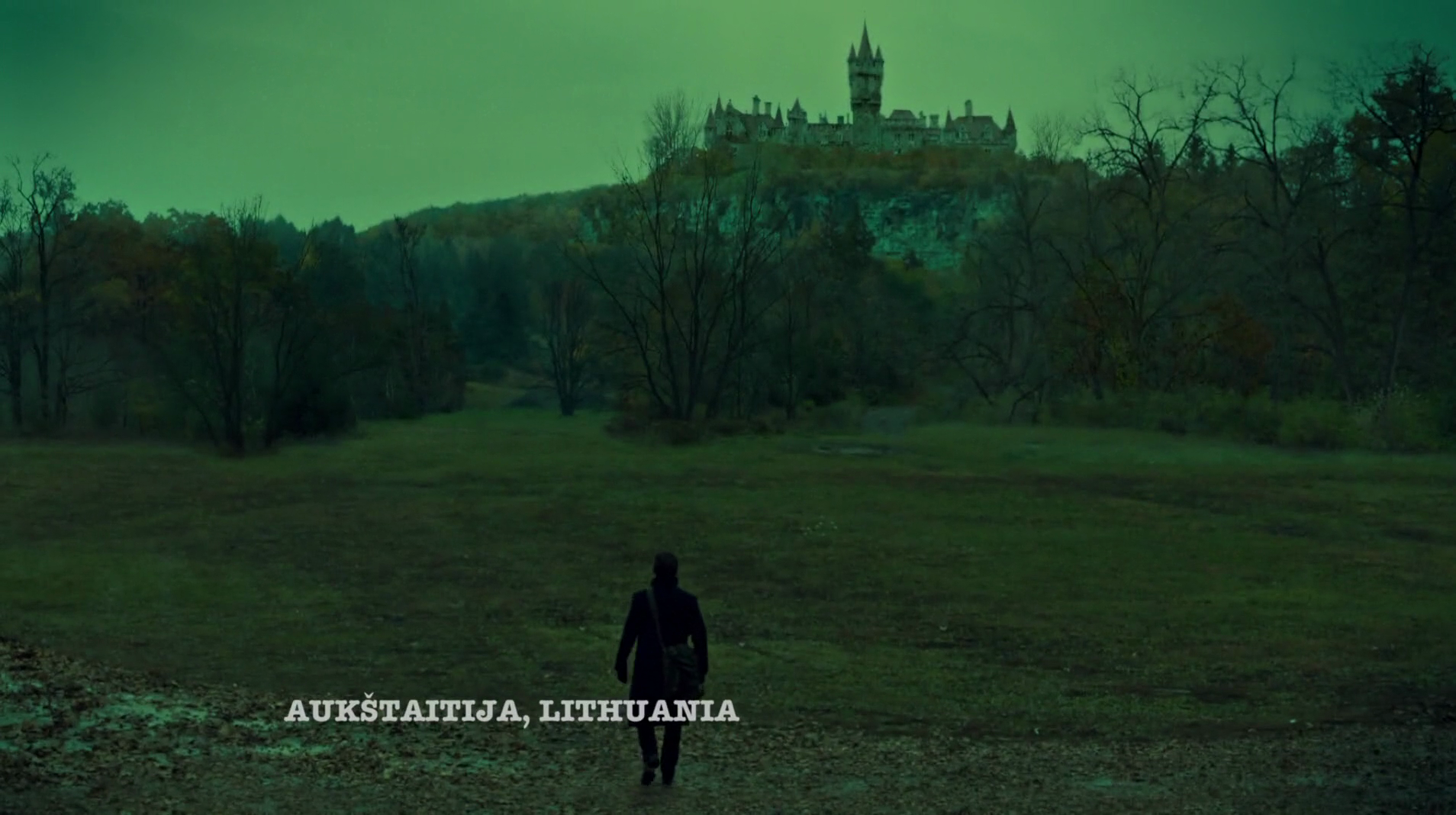
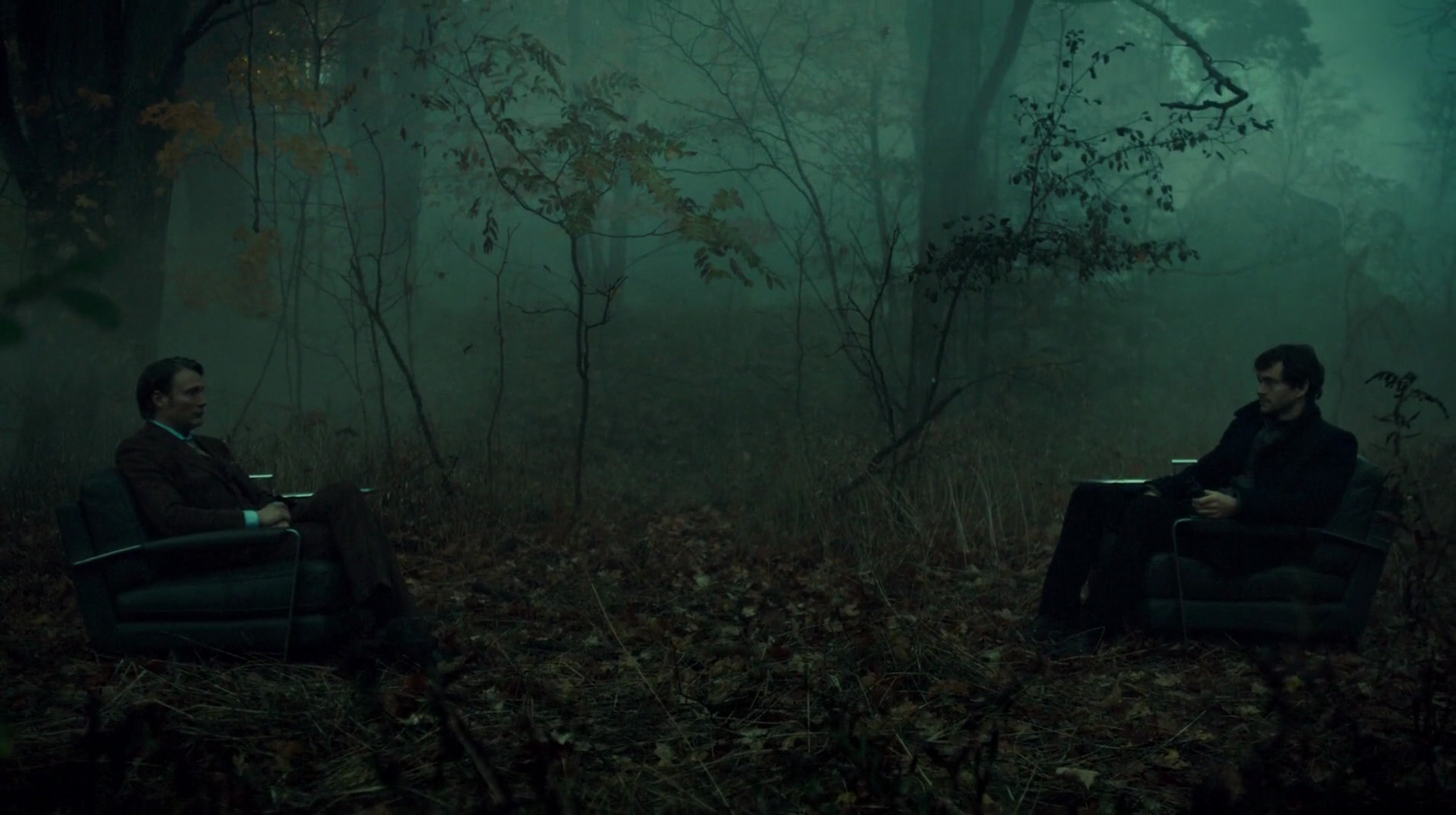
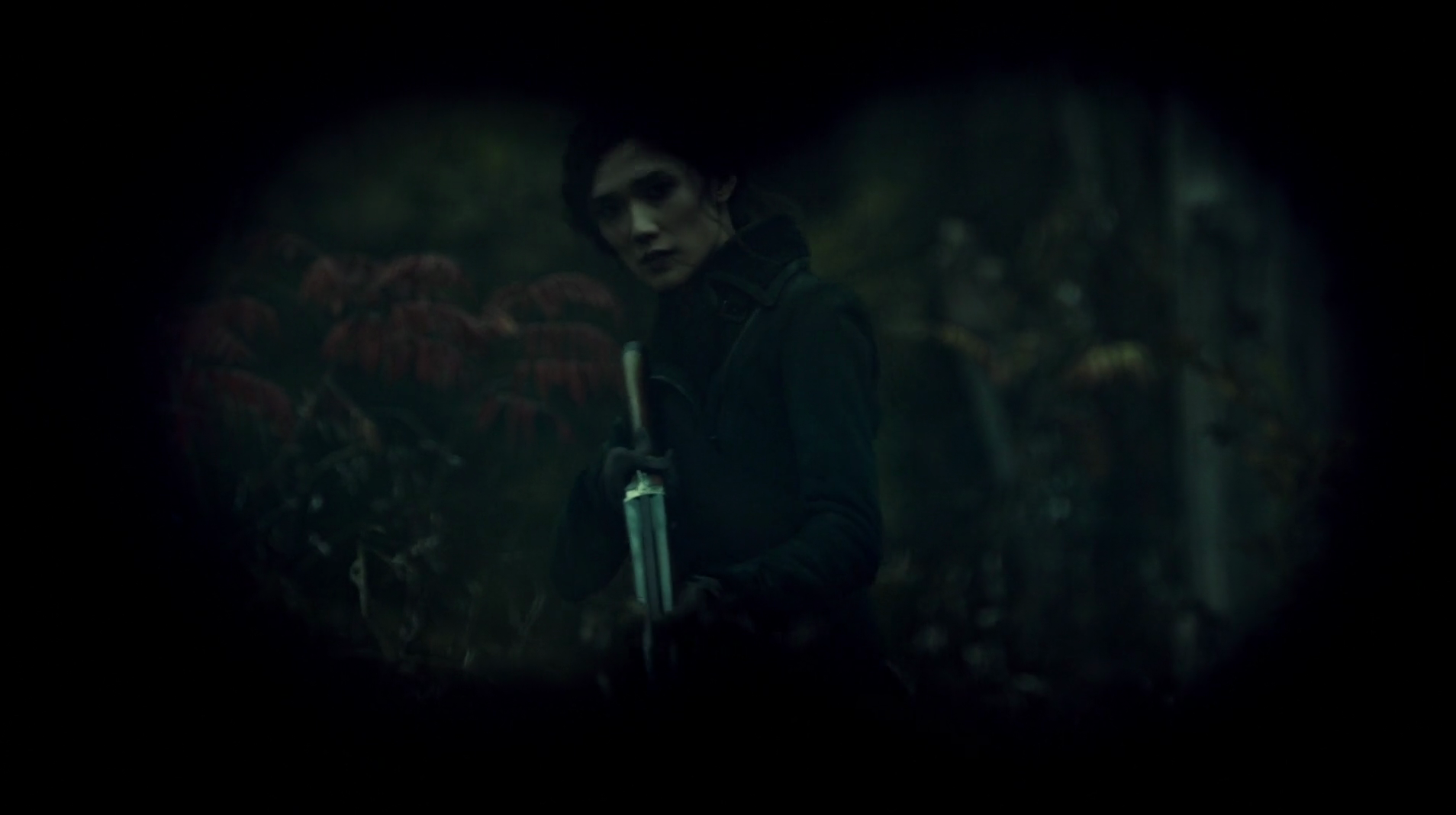
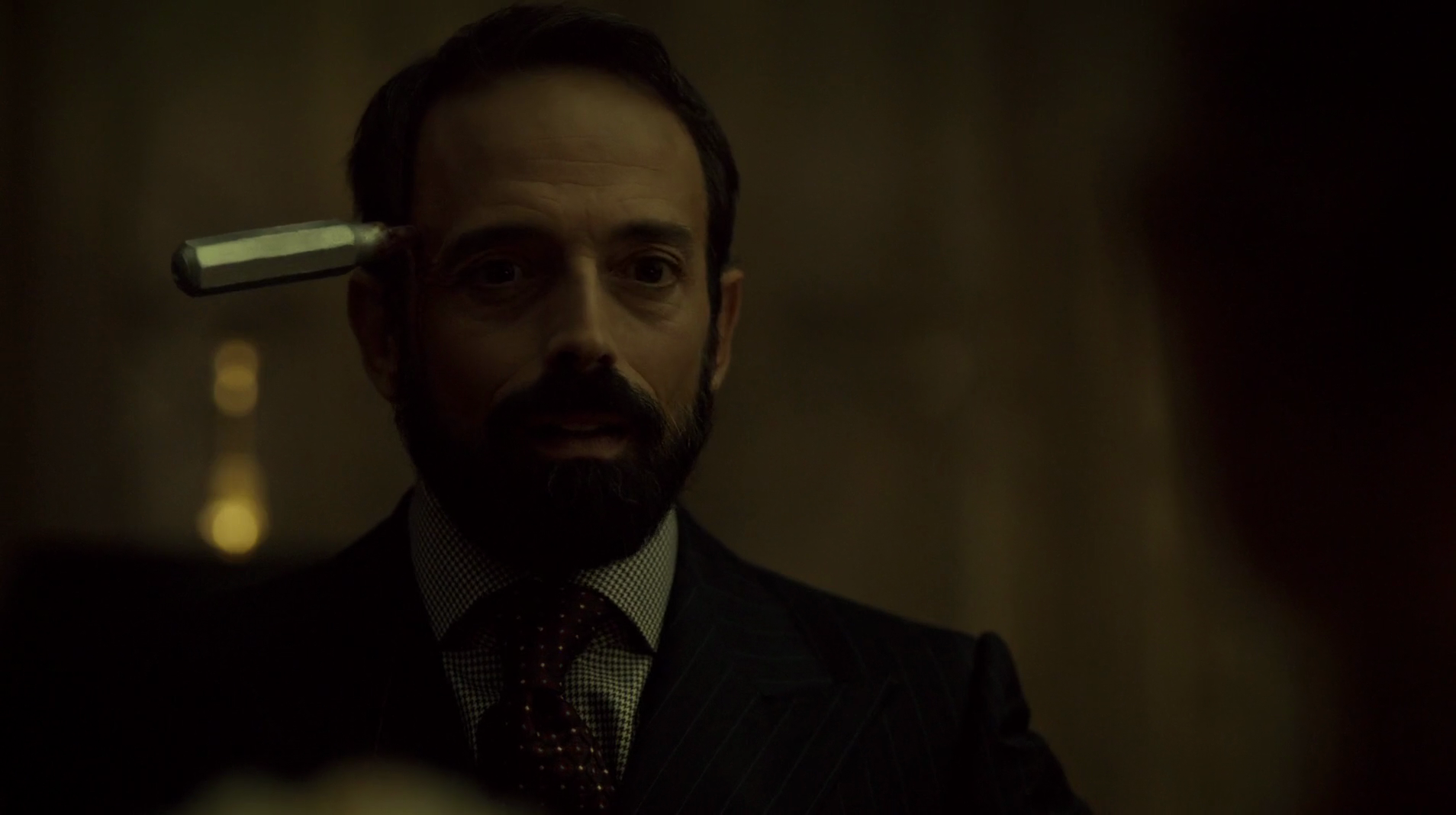
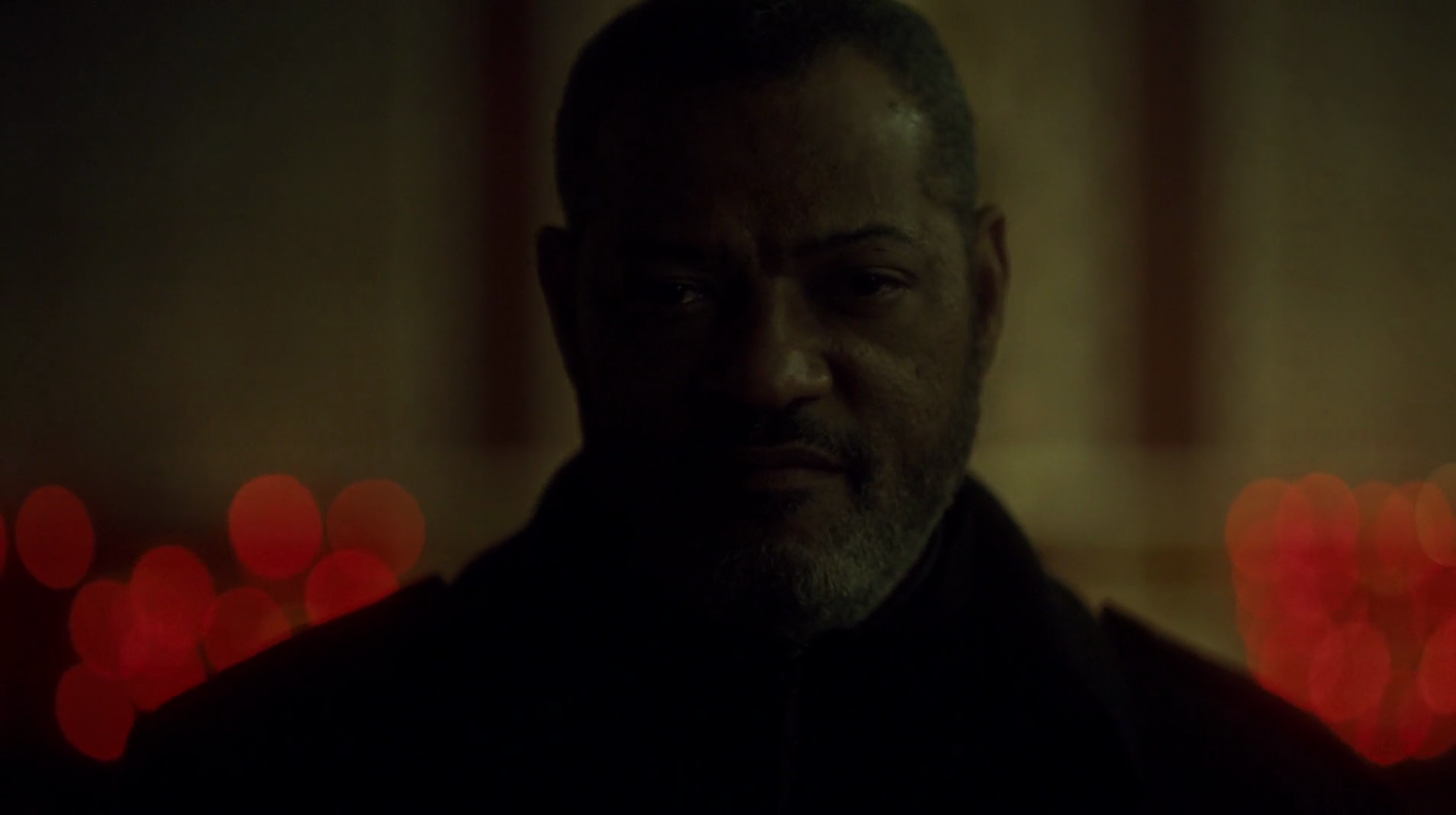
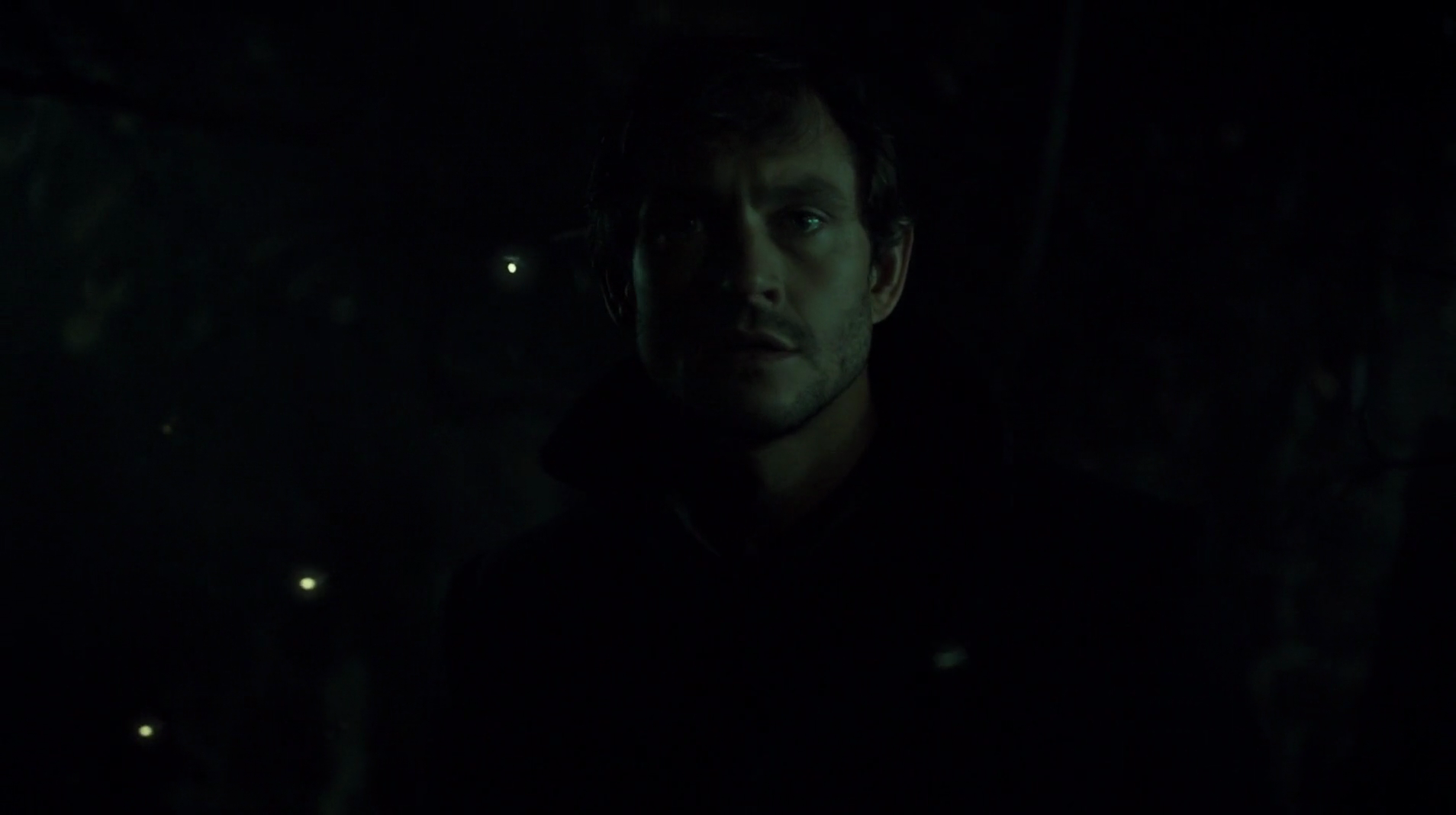
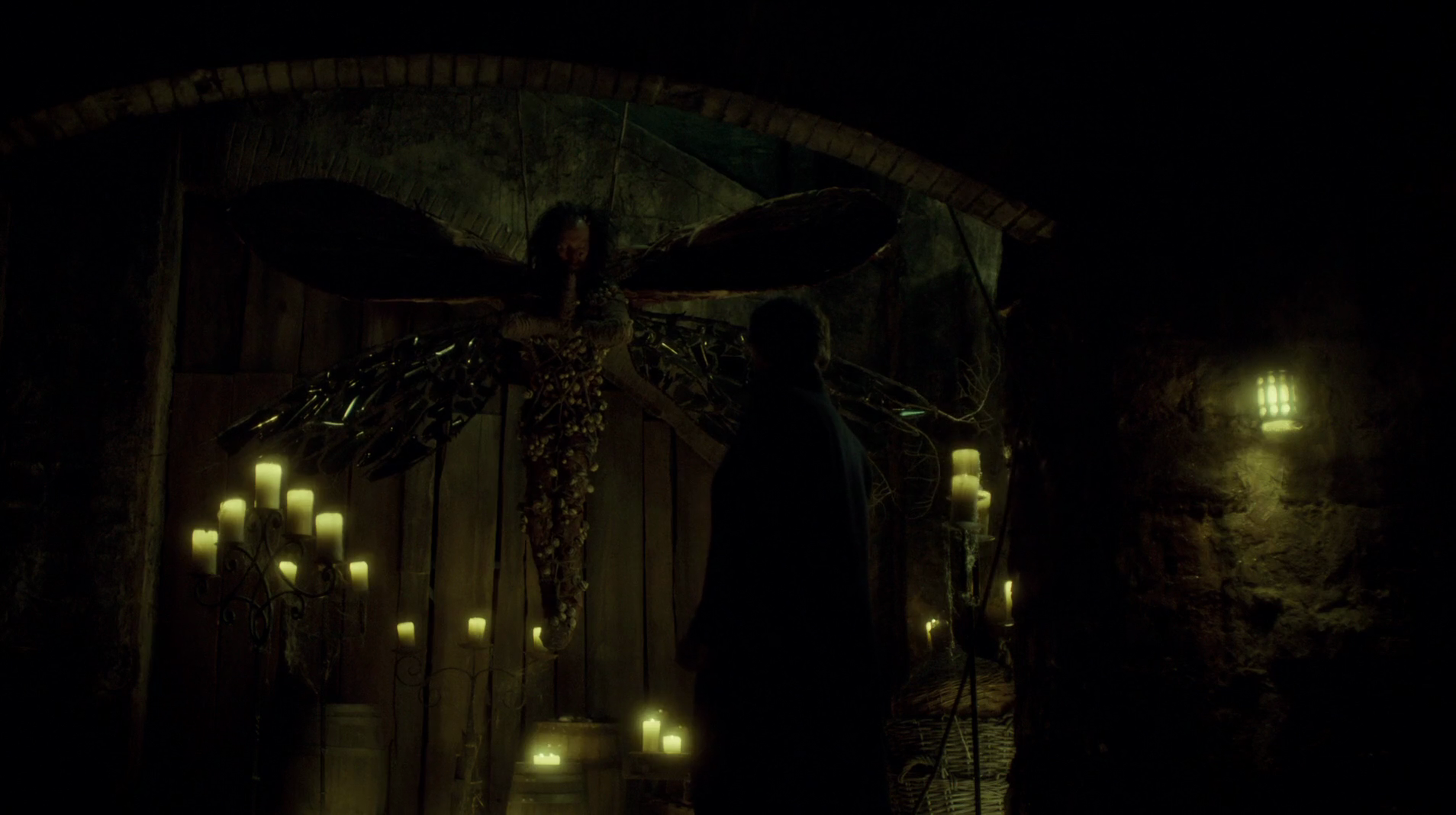
August 11, 2020 @ 11:46 am
“Rooting for Mephistopheles and contemptuous of Faust” also comes from Hannibal Rising.